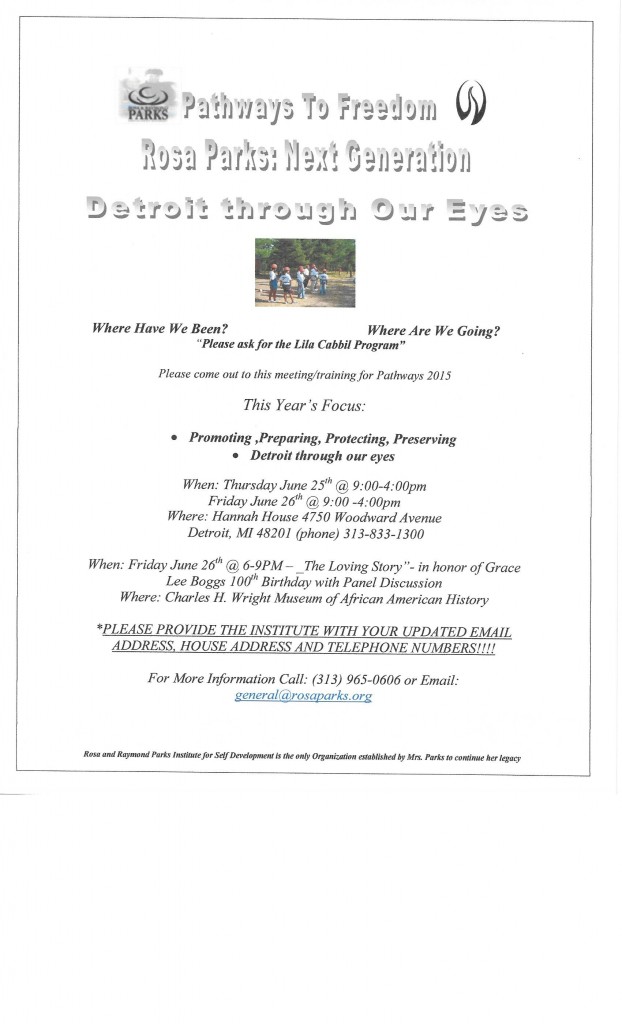Pathways to Freedom Alumni “Early-Morning Inspiration and Meditation.”


Amelia Robinson Boynton Final Arrangements
Dear ANSC Members:
Amelia Robinson Boynton Final Arrangements
Saturday, September 5, 2015
9:00 a.m. Foot Solders will escort horse drawn carriage from Walker Mortuary to Tabernacle Baptist Church\11:00 a.m. Memorial Service ~ Tabernacle Baptist Church Selma, AL (1431 Broad Street)
Sunday, September 6, 2015
12:00 p. m. Memorial Service ~ at Tuskegee University Chapel
Tuesday, September 8, 2015
1:00 p.m. Homegoing Celebration ~ Edmund Pettus Bridge , Selma, AL
Felecia Zigler Pettway, J.D. Wallace Community College Selma Interim Director Advanced Visualization Center 334-876-9379 felecia.pettway@wccs.edu
Teacher Professional Development @ The Library of Congress
Rosa Parks: A Primary Source Gallery

[Detail] Rosa Parks, circa 1950
On Dec. 1, 1955, Rosa Parks was arrested when she refused to surrender her seat on a Montgomery, Alabama, bus to a white passenger. The arrest led to the Montgomery Bus Boycott, a seminal event in the U.S. Civil Rights Movement, and was a defining moment in Parks’ long career as an activist.
This gallery showcases a selection of items from the Rosa Parks Collection at the Library of Congress, which is on loan to the Library for 10 years from the Howard G. Buffett Foundation. This collection contains thousands of items that document the life, work, and legacy of this civil-rights legend.
For more on the Rosa Parks Collection, visit these two Library of Congress blog posts: Inside the Rosa Parks Collection; Happy Birthday Rosa Parks!
To support students as they analyze these primary sources, use the Library’s primary source analysis tool and teacher’s guides.
 Rosa Parks, circa 1950. Photograph by ThomasView PDF (291 KB)
Rosa Parks, circa 1950. Photograph by ThomasView PDF (291 KB) Early Childhood Incidents and Experiences, ca. 1955-1958. Autograph manuscript. Rosa Parks Papers. Manuscript Division, Library of Congress. (Rosa Parks recounts the desertion of her father, James McCauley, and growing up in rural Pine Level, Alabama on the farm of maternal grandparents, Sylvester and Rosa Edwards, with her mother and brother, Leona and Sylvester McCauley.)View PDF (1.45 MB)
Early Childhood Incidents and Experiences, ca. 1955-1958. Autograph manuscript. Rosa Parks Papers. Manuscript Division, Library of Congress. (Rosa Parks recounts the desertion of her father, James McCauley, and growing up in rural Pine Level, Alabama on the farm of maternal grandparents, Sylvester and Rosa Edwards, with her mother and brother, Leona and Sylvester McCauley.)View PDF (1.45 MB)![Rosa Parks. [Reflections on her arrest for refusing to surrender her bus seat to a white passenger, December 1, 1955], ca. 1956. Autograph manuscript. Rosa Parks Papers. Manuscript Division, Library of Congress.](http://www.loc.gov/teachers/professionaldevelopment/teacherinstitute/resources/rosa-parks-gallery/images/reflections.jpg) Rosa Parks. [Reflections on her arrest for refusing to surrender her bus seat to a white passenger, December 1, 1955], ca. 1956. Autograph manuscript. Rosa Parks Papers. Manuscript Division, Library of Congress.View PDF (734 KB)
Rosa Parks. [Reflections on her arrest for refusing to surrender her bus seat to a white passenger, December 1, 1955], ca. 1956. Autograph manuscript. Rosa Parks Papers. Manuscript Division, Library of Congress.View PDF (734 KB) Montgomery Fair date book with Rosa Parks’ notes concerning the Montgomery Bus Boycott, 1955–1956. Rosa Parks Papers, Manuscript Division, Library of Congress.View PDF (886 KB)
Montgomery Fair date book with Rosa Parks’ notes concerning the Montgomery Bus Boycott, 1955–1956. Rosa Parks Papers, Manuscript Division, Library of Congress.View PDF (886 KB) Notes in which Rosa Parks recounts her arrest after “the bus incident.” The notes also describe hardships Parks faced during this period in her life including being “shunned” by everyone in her workplace.View PDF (1.2 MB)
Notes in which Rosa Parks recounts her arrest after “the bus incident.” The notes also describe hardships Parks faced during this period in her life including being “shunned” by everyone in her workplace.View PDF (1.2 MB) Letter in which Rosa Parks returns to work after becoming well known as part of her Civil Rights efforts. The letter describes the hardships Parks faced during this period in her life, including being “shunned” by everyone in her workplace.View PDF (217 KB)
Letter in which Rosa Parks returns to work after becoming well known as part of her Civil Rights efforts. The letter describes the hardships Parks faced during this period in her life, including being “shunned” by everyone in her workplace.View PDF (217 KB)![[Rosa & Raymond Parks, seated at a banquet table, left side, third and fourth chair, likely at an NAACP branch meeting, Montgomery, Alabama]](http://www.loc.gov/teachers/professionaldevelopment/teacherinstitute/resources/rosa-parks-gallery/images/banquet.jpg) [Rosa & Raymond Parks, seated at a banquet table, left side, third and fourth chair, likely at an NAACP branch meeting, Montgomery, Alabama]View PDF (230 KB)
[Rosa & Raymond Parks, seated at a banquet table, left side, third and fourth chair, likely at an NAACP branch meeting, Montgomery, Alabama]View PDF (230 KB) Draft letter to a “friend” written by Parks describing racial segregation in Montgomery, Ala. Written on Montgomery Fair department store stationery. Parks was let go from her job as an assistant tailor at the store that month.View PDF (1.5 MB)
Draft letter to a “friend” written by Parks describing racial segregation in Montgomery, Ala. Written on Montgomery Fair department store stationery. Parks was let go from her job as an assistant tailor at the store that month.View PDF (1.5 MB) Rosa Parks to Leona McCauley (Mother) concerning the execution of Jeremiah Reeves, a black Alabama teenager falsely convicted of raping a white woman, April 7, 1958. Autograph letter. Rosa Parks Papers. Manuscript Division, Library of Congress.View PDF (679 KB)
Rosa Parks to Leona McCauley (Mother) concerning the execution of Jeremiah Reeves, a black Alabama teenager falsely convicted of raping a white woman, April 7, 1958. Autograph letter. Rosa Parks Papers. Manuscript Division, Library of Congress.View PDF (679 KB) NAACP Baltimore Branch flyer advertising a lecture by Rosa Parks at the Sharp Street Methodist Church, September 23, 1956.View PDF (380 KB)
NAACP Baltimore Branch flyer advertising a lecture by Rosa Parks at the Sharp Street Methodist Church, September 23, 1956.View PDF (380 KB) Rosa Parks recounting a childhood encounter with a white boy who threatened to hit her, ca. 1955-1958. Autograph manuscript. Rosa Parks Papers. Manuscript Division, Library of Congress.View PDF (897 KB)
Rosa Parks recounting a childhood encounter with a white boy who threatened to hit her, ca. 1955-1958. Autograph manuscript. Rosa Parks Papers. Manuscript Division, Library of Congress.View PDF (897 KB) Photo showing Rosa Parks and Martin Luther King at Civil Rights related “training” at Highlander School in Tennessee. First published by GA Commission on Education; here in Atlanta Courier.View PDF (990 KB)
Photo showing Rosa Parks and Martin Luther King at Civil Rights related “training” at Highlander School in Tennessee. First published by GA Commission on Education; here in Atlanta Courier.View PDF (990 KB)![Black activist Kwame Toure (L) formerly known as Stokley [i.e. Stokely] Carmichael ... at the University of Michigan to discuss civil rights at a forum. Another civil rights leader Roas [i.e. Rosa] Parks (R) has a lighter moment with Toure after a panel discussion](http://www.loc.gov/teachers/professionaldevelopment/teacherinstitute/resources/rosa-parks-gallery/images/kwameToure.jpg) Black activist Kwame Toure (L) formerly known as Stokley [i.e. Stokely] Carmichael … at the University of Michigan to discuss civil rights at a forum. Another civil rights leader Roas [i.e. Rosa] Parks (R) has a lighter moment with Toure after a panel discussion.View PDF (228 KB)
Black activist Kwame Toure (L) formerly known as Stokley [i.e. Stokely] Carmichael … at the University of Michigan to discuss civil rights at a forum. Another civil rights leader Roas [i.e. Rosa] Parks (R) has a lighter moment with Toure after a panel discussion.View PDF (228 KB) Rosa Parks and U.S. Congressman John Conyers Jr., picketing in front of General Motors corporate headquarters, Detroit, Michigan.View PDF (256 KB)
Rosa Parks and U.S. Congressman John Conyers Jr., picketing in front of General Motors corporate headquarters, Detroit, Michigan.View PDF (256 KB) Saint Matthew A.M.E. Church service program with Rosa Parks’ handwritten notes and prayer, November 26, 1972. Program with autograph annotations. Rosa Parks Papers. Manuscript Division, Library of Congress.View PDF (705 KB)
Saint Matthew A.M.E. Church service program with Rosa Parks’ handwritten notes and prayer, November 26, 1972. Program with autograph annotations. Rosa Parks Papers. Manuscript Division, Library of Congress.View PDF (705 KB)
***Date Change*** June General Membership Meeting
Water Affordability & Safety Hearing TOMORROW
What: Water Affordability & Safety Hearing
Who: Convened by Representatives Sheldon Neeley and Stephanie Chang and joined by other members of the Michigan legislature
When: Wednesday, June 3, 2015, 10 – 11:30 a.m.
Where: Room 426, Capitol Building, 100 Capitol Ave, Lansing, MI 48933
Representatives Chang and Neeley, along with their Detroit and Flint colleagues in the Michigan legislature, invite community organizations and residents across Michigan to come and testify about issues related to water affordability and safety.
Since January 1, 2013, over 53,000 Detroiters had their water and sewerage abruptly terminated. Around 15,000 homes were not restored to service. There is financial assistance available, but a large number of residents (what is the number) on payment plans are behind on their payments. Last year, the United Nations Human Rights Council visited Detroit to intervene in Detroit’s water crisis, and the Lyda et al v City of Detroit lawsuit, brought by ten Detroit families experiencing water shutoffs, brought national attention to the crisis. We invite residents to participate and share testimony about the affordability, public health, constitutional and human rights aspects of Detroit’s water crisis as well as potential solutions.
In April 2014, the City of Flint switched from the Detroit water system to its own system using the Flint River. Residents discovered that the water they were using in their homes had a strange smell, taste, and appearance. Last year, high e-‐coli levels forced boil-‐water advisories, and then residents experienced skin rashes and hair loss. (What else should be added here) We invite residents to participate and share testimony about the safety, public health, and human rights aspects of Flint’s water crisis as well as potential solutions.





